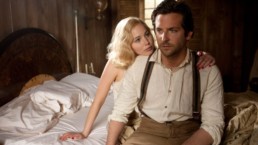Review: ‘Serena’
Bradley Cooper and Jennifer Lawrence reunite once again, this time in a misguided Depression-era drama.
On paper, Serena is the textbook prestige picture. The most obvious element that gives it this outward appearance is the reunion of the dynamite, Oscar-magnet pair of Bradley Cooper and Jennifer Lawrence. For their third film together in three years (until they are paired again for David O. Russell’s Joy this December), they are guided by Danish director Susanne Bier who’s In A Better World took home the Best Foreign Language Film Oscar in 2011. Couple that with a period-set screenplay based on a New York Times bestseller and you have the making of an early Awards favorite. But so the film arrives, muddied and bruised from a rough road to theaters and VOD. After two years of production delays, recuts and hazy press, it is, admittedly, really quite difficult to separate Serena from its production woes. Alas, even taken with a clear perspective, the film arrives rather lost.
Set in late-1920s Appalachia, the film follows the lumber magnate George Pemberton (Bradley Cooper) as he flattens acres of North Carolina woodlands before conservationists, led by the town sheriff (Toby Jones), pass a bill to preserve the area as a national park. Pemberton falls in love with a logger’s daughter, Serena (Jennifer Lawrence), and their swift marriage is marked with tacky equestrian sequences and awkward sex scenes. She becomes a respected manager in George’s endeavors, much to the frustration of Pemberton’s business partners, beginning a murderous Macbeth-ian turn of events that threatens George and Serena’s lives and relationship.
Serena plays like a fable that aims for the complex morality of There Will Be Blood, but gets stuck in the swamps of generic period sentimentality.
It is all very classic melodrama, almost to a fault. The plot often dirties itself with the fascinating paradox of the reverence for this country’s great beauty and its destruction allowed to pursue the American dream. These conversations of Industrial Age greed are all too brief and quickly washed away with soap opera theatrics. Much of this is attributed to Lawrence and the Serena character. She belly flops in the titular role giving a bipolar performance that is both robotic in dialogue and hammy in its physicality. It is really a disappointment that the character is handled so poorly. Serena is a strong female foil that is should be much welcomed in Hollywood, but her feminine qualities are unfairly dramatized by the sloppy direction. On the contrary, Cooper shows off remarkable control over Bier’s misguided hand, despite how selfish and unlikeable Pemberton is. The supporting cast does some great work as well, especially a compelling David Dencik as Pemberton’s right-hand man.
The classicism all feels very dated. Not as in: “Wow! This is really evokes the 20s!” More like: “Wow! Jennifer Lawrence hasn’t aged a wrinkle since the 90s!” Serena plays like a fable that aims for the complex morality of There Will Be Blood, but gets stuck in the swamps of generic period sentimentality. The soft lighting and distracting score attempt to squeeze any emotional significance left in the meandering narrative. The choppy editing only magnifies the disarray, highlighting poor coverage and bizarre plot organization. It twists when it doesn’t have to conjuring disorder instead of dramatics and the last act may be one of the more berserk half hours of this cinematic year. It is a strange experience. It should be an event only because of its star power, but ultimately it is only a fascinating flop.
Serena is in theaters March 27th.
Jasper Bernbaum
Jasper is a contributing writer for Cinemacy. He combines his love of music with his visual eye into a passion for live photography. He holds a BFA in Film Production from Chapman University and is an avid filmmaker, watcher, and all around cultural adventurer.


